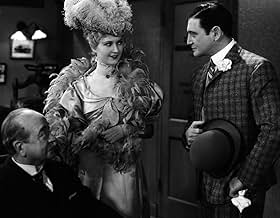Fulton Oursler (1893-1952) is best remembered today for his widely-read book, "The Greatest Story Ever Told," but he was a prolific author whose stories occasionally became screenplays. In his novel, "The Great Jasper," Mr. Oursler devised an interesting story based on elements and settings well-known to him. He grew up in Baltimore, as did protagonist Jasper Horn, and his father was in charge of a streetcar line - as was Jasper. The author and his lead character were skeptical of pseudo-spiritualism, but both had involvement in that field. Young authors are often exhorted to write about things they know best, and the off-beat, entertaining "Great Jasper" follows that advice.
Richard Dix is splendid in the title role, assuming a slight Irish-American brogue not indicated in the novel. He portrays the philandering motorman with charm and is splendidly supported by stage actress Florence Eldridge in the role of "Jenny," the faithful, long-suffering wife who disapproves of all the vices which Jasper beguilingly embodies. When the irresponsible motorman finally goes too far and has an affair with his boss' young and beautiful wife (Wera Engels), he loses both his employment and his deeply hurt wife. Jasper decides to get a new start in Atlantic City, where fun is the perennial byword, and takes along his young son (well portrayed by David Durand) so that he may learn to be uninhibited and to live for the moment as does his father.
A fortune-teller named Madame Talma (Edna May Oliver) leads Jasper into a new life as spiritualist "The Great Jasper," and the film closely follows Mr. Oursler's novel from that point forth - with unlikely but enjoyable plot twists and delightful coincidences abounding. As he did more than once on-screen, Mr. Dix ages as the story takes him from a fun-loving young adult to a repentant old man. Performances are uniformly excellent - with Bruce Cabot, Betty Furness, Walter Walker and others providing fine support. The story is far off the beaten path, yet unfolds convincingly, very well-directed by J. Walter Ruben.
























